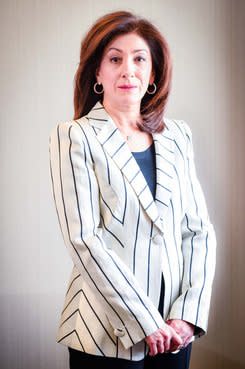High-End M&A Meets a New Challenge: Too Many White Men


Faiza Saeed, presiding partner at Cravath, Swaine & Moore. March 6, 2019. (Photo: David Handschuh/ALM)
As the legal industry places more emphasis on diversity, the scrutiny hasn't escaped one of the profession's most exclusive corners: high-stakes mergers and acquisitions.
But for Wall Street firms that rarely hire laterals, ensuring diversity on trusted deal teams can be especially challenging, and efforts to retain and promote diverse lawyers early in the associate cycle are especially critical.
Some firms in that group, including Cravath, Swaine & Moore and Sullivan & Cromwell, say they are making progress on that front.
Diversity is permeating the consciousness of clients, said Joseph Frumkin, managing partner of Sullivan & Cromwell's M&A group. When Frumkin was pitching in a beauty contest for a $40 billion deal and brought a female associate who did much of the preparation work, he said, the firm got hired.
“The client told me the fact that we had a woman involved" was a plus for Sullivan & Cromwell in being selected, he said.
Still, Frumkin acknowledged that diversity isn't always a major consideration. “It can be pushed into the background a little bit more on the highest-stake deals, where they are like, ‘Yes, it would be nice to have a woman, but I want the person who has done the last 10 like this,’” Frumkin said.
The inherent difficulty of being available 24/7 on a pending M&A deal can lead to tough choices for new parents in particular. “It’s a hard balance—the hours, the unpredictability—it’s not easy,” Frumkin said.

Joseph Frumkin of Sullivan & Cromwell.
Sullivan & Cromwell has lately experimented with different approaches to reintegrating lawyers from maternity leave, he said, including setting aside hours in which other team members know they’re not available, and having others be prepared to cover calls.
The firm has also experimented with slightly overstaffing deals, so the returning lawyer feels like they have more support. While the firm normally staffs leanly, “we’ve tried to add a little bit of staffing to remove some of the stress from them,” Frumkin said, adding the firm also monitors their deals to make sure they’re getting enough high-quality work to progress to partnership.
The firm would apply the same approaches for a man coming back from paternity leave, he added.
"It’s hard for them,” Frumkin said about parents returning from leave. “The job we do is demanding in ways that are unpredictable, and unpredictability with people who have a lot of child care responsibilities is really hard. But I think we’re making progress.”
Sullivan & Cromwell’s new partner class of eight included two women litigators but no female corporate promotions this year. Francis Aquila, another M&A partner at the firm, said while it would always like to do better, Sullivan & Cromwell has a “very strong record” of recruiting, retaining and promoting women in corporate practices. He cited Janet Thiele Geldzahler in Washington, D.C.; Alexandra Korry, Audra Cohen and Melissa Sawyer in New York; and on the West Coast, Alison Ressler, Rita-Anne O'Neill and Sarah Payne.
Meanwhile, Cravath's newest partner class of three lawyers, announced in November, were all women, a point cheered on by diversity advocates and some corporate counsel closely examining the diversity of new partner classes. The three women include two corporate partners and one litigation partner.

Frank Aquila of Sullivan & Cromwell.
Cravath presiding partner Faiza Saeed, a top M&A adviser herself, said she doesn’t take credit for the number of new women partners in recent years. She noted it’s a seven-year timeline from first-year associate to being considered for the partnership. About a quarter of Cravath’s partners are women, she said.
“We want it to be fully reflective of what the law school population is, so there’s more work to be done,” Saeed said. "But I think we have reached the point now—and I think you are seeing the fruits of that effort over a 20- or 25-year period—in terms of now seeing more women in our partnership classes year in and year out."
Saeed emphasized that the effort isn't just a matter of satisfying client demands about diversity, but a firm priority. “We’re talent driven. We want to bring in the best people,” she said.
This year, the firm announced an internship program with Fisk University, a historically black college. One of the school’s founders was Erastus Milo Cravath, whose son, Paul Drennan Cravath, went on to become a name partner.
Saeed said she has no expectation that the undergraduate interns from Fisk will necessarily go on to law school, but the training itself will be rewarding.
“I think we’re going to get a lot out of having them here—having a diversity of backgrounds inside an organization,” she said.



